傲慢与偏见英文版简介
傲慢与偏见故事梗概英文版
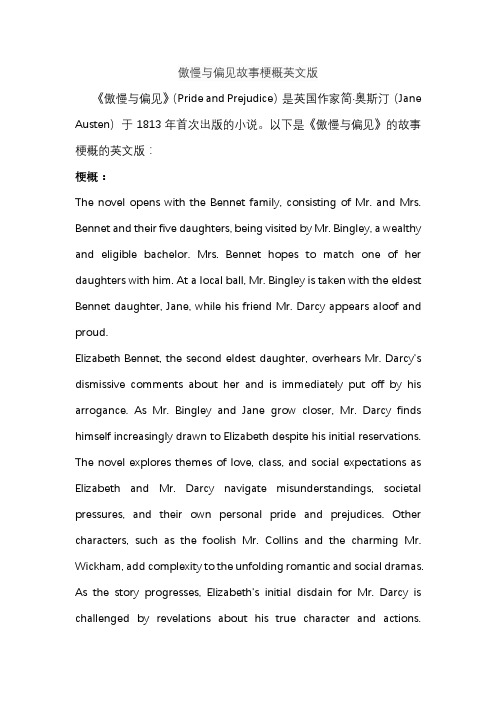
傲慢与偏见故事梗概英文版《傲慢与偏见》(Pride and Prejudice)是英国作家简·奥斯汀(Jane Austen)于1813年首次出版的小说。
以下是《傲慢与偏见》的故事梗概的英文版:梗概:The novel opens with the Bennet family, consisting of Mr. and Mrs. Bennet and their five daughters, being visited by Mr. Bingley, a wealthy and eligible bachelor. Mrs. Bennet hopes to match one of her daughters with him. At a local ball, Mr. Bingley is taken with the eldest Bennet daughter, Jane, while his friend Mr. Darcy appears aloof and proud.Elizabeth Bennet, the second eldest daughter, overhears Mr. Darcy's dismissive comments about her and is immediately put off by his arrogance. As Mr. Bingley and Jane grow closer, Mr. Darcy finds himself increasingly drawn to Elizabeth despite his initial reservations. The novel explores themes of love, class, and social expectations as Elizabeth and Mr. Darcy navigate misunderstandings, societal pressures, and their own personal pride and prejudices. Other characters, such as the foolish Mr. Collins and the charming Mr. Wickham, add complexity to the unfolding romantic and social dramas. As the story progresses, Elizabeth's initial disdain for Mr. Darcy is challenged by revelations about his true character and actions.Similarly, Mr. Darcy must confront his own pride and rethink his attitudes towards those he considers beneath him.In the end, after various twists and turns, misunderstandings are cleared, and Elizabeth and Mr. Darcy come to understand and appreciate each other. Their eventual union is a triumph over the societal norms and prejudices that initially kept them apart.Note: This is a brief summary of the novel, and the richness of the characters and social commentary in "Pride and Prejudice" is best appreciated by reading the full text.。
Pride-and-Prejudice-傲慢与偏见中英文双语简介
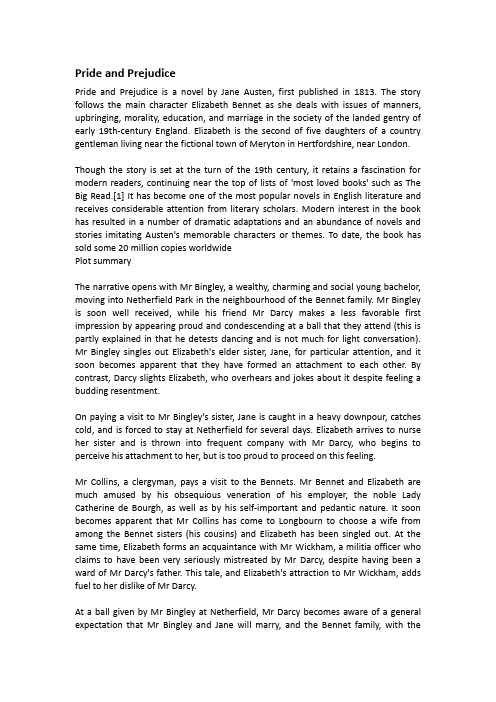
Pride and PrejudicePride and Prejudice is a novel by Jane Austen, first published in 1813. The story follows the main character Elizabeth Bennet as she deals with issues of manners, upbringing, morality, education, and marriage in the society of the landed gentry of early 19th-century England. Elizabeth is the second of five daughters of a country gentleman living near the fictional town of Meryton in Hertfordshire, near London. Though the story is set at the turn of the 19th century, it retains a fascination for modern readers, continuing near the top of lists of 'most loved books' such as The Big Read.[1] It has become one of the most popular novels in English literature and receives considerable attention from literary scholars. Modern interest in the book has resulted in a number of dramatic adaptations and an abundance of novels and stories imitating Austen's memorable characters or themes. To date, the book has sold some 20 million copies worldwidePlot summaryThe narrative opens with Mr Bingley, a wealthy, charming and social young bachelor, moving into Netherfield Park in the neighbourhood of the Bennet family. Mr Bingley is soon well received, while his friend Mr Darcy makes a less favorable first impression by appearing proud and condescending at a ball that they attend (this is partly explained in that he detests dancing and is not much for light conversation). Mr Bingley singles out Elizabeth's elder sister, Jane, for particular attention, and it soon becomes apparent that they have formed an attachment to each other. By contrast, Darcy slights Elizabeth, who overhears and jokes about it despite feeling a budding resentment.On paying a visit to Mr Bingley's sister, Jane is caught in a heavy downpour, catches cold, and is forced to stay at Netherfield for several days. Elizabeth arrives to nurse her sister and is thrown into frequent company with Mr Darcy, who begins to perceive his attachment to her, but is too proud to proceed on this feeling.Mr Collins, a clergyman, pays a visit to the Bennets. Mr Bennet and Elizabeth are much amused by his obsequious veneration of his employer, the noble Lady Catherine de Bourgh, as well as by his self-important and pedantic nature. It soon becomes apparent that Mr Collins has come to Longbourn to choose a wife from among the Bennet sisters (his cousins) and Elizabeth has been singled out. At the same time, Elizabeth forms an acquaintance with Mr Wickham, a militia officer who claims to have been very seriously mistreated by Mr Darcy, despite having been a ward of Mr Darcy's father. This tale, and Elizabeth's attraction to Mr Wickham, adds fuel to her dislike of Mr Darcy.At a ball given by Mr Bingley at Netherfield, Mr Darcy becomes aware of a general expectation that Mr Bingley and Jane will marry, and the Bennet family, with theexception of Jane and Elizabeth, make a public display of poor manners and decorum. The following morning, Mr Collins proposes marriage to Elizabeth, who refuses him, much to her mother's distress. Mr Collins recovers and promptly becomes engaged to Elizabeth's close friend Charlotte, a homely woman with few prospects. Mr Bingley abruptly quits Netherfield and returns to London, and Elizabeth is convinced that Mr Darcy and Mr Bingley's sister have conspired to separate him from Jane.In the spring, Elizabeth visits Charlotte and Mr Collins in Kent. Elizabeth and her hosts are frequently invited to Rosings Park, home of Lady Catherine de Bourgh, Darcy's aunt; coincidentally, Darcy also arrives to visit. Darcy again finds himself attracted to Elizabeth and impetuously proposes to her. Elizabeth, however, has just learned of Darcy's role in separating Mr Bingley from Jane from his cousin Colonel Fitzwilliam. She angrily rebukes him, and a heated discussion follows; she charges him with destroying her sister's happiness, with treating Mr Wickham disgracefully, and with having conducted himself towards her in an ungentleman-like manner. Mr Darcy, shocked, ultimately responds with a letter giving a good account of (most of) his actions: Wickham had exchanged his legacies for a cash payment, only to return after gambling away the money to reclaim the forfeited inheritance; he then attempted to elope with Darcy's young sister, thereby to capture her fortune. Regarding Mr Bingley and Jane, Darcy claimed he had observed no reciprocal interest in Jane for Bingley. Elizabeth later came to acknowledge the truth of Darcy's assertions.Some months later, Elizabeth and her Aunt and Uncle Gardiner visit Pemberley, Darcy's estate, believing he will be absent for the day. He returns unexpectedly, and though surprised, he is gracious and welcoming. He treats the Gardiners with great civility; he introduces Elizabeth to his sister, and Elizabeth begins to realise her attraction to him. Their reacquaintance is cut short, however, by news that Lydia, Elizabeth's sister, has run away to elope with Mr Wickham. Elizabeth and the Gardiners return to Longbourn, where Elizabeth grieves that her renewed acquaintance with Mr Darcy will end because of her sister's disgrace.Lydia and Wickham are soon found, then married by the clergy; they visit Longbourn, where Lydia lets slip that Mr Darcy was responsible for finding the couple and negotiating their marriage—at great expense to himself. Elizabeth is shocked but does not dwell further on the topic due to Mr Bingley's return and subsequent proposal to Jane, who immediately accepts.Lady Catherine de Bourgh later bursts in on Longbourn; intending to thwart local rumour, she warns Elizabeth against marrying Mr Darcy. Elizabeth refuses her demands. Disgusted, Lady Catherine leaves and drops by to inform her nephew on Elizabeth's abominable behaviour. However, this lends hope to Darcy that Elizabeth's opinion of him may have changed. He travels to Longbourn and proposes again; and now Elizabeth accepts.Major themesMany critics take the novel's title as a starting point when analysing the major themes of Pride and Prejudice; however, Robert Fox cautions against reading too much into the title because commercial factors may have played a role in its selection. "After the success of Sense and Sensibility, nothing would have seemed more natural than to bring out another novel of the same author using again the formula of antithesis and alliteration for the title. It should be pointed out that the qualities of the title are not exclusively assigned to one or the other of the protagonists; both Elizabeth and Darcy display pride and prejudice."[5]A major theme in much of Austen's work is the importance of environment and upbringing on the development of young people's character and morality.[6] Social standing and wealth are not necessarily advantages in her world, and a further theme common to Jane Austen's work is ineffectual parents. In Pride and Prejudice, the failure of Mr and Mrs Bennet as parents is blamed for Lydia's lack of moral judgment; Darcy, on the other hand, has been taught to be principled and scrupulously honourable, but he is also proud and overbearing.[6] Kitty, rescued from Lydia's bad influence and spending more time with her older sisters after they marry, is said to improve greatly in their superior society内容简介说故事最主要是围绕着18世纪末19世纪初,英国地主乡绅贵族的求爱和婚姻问题。
Pride and Prejudice傲慢与偏见简介英国文学
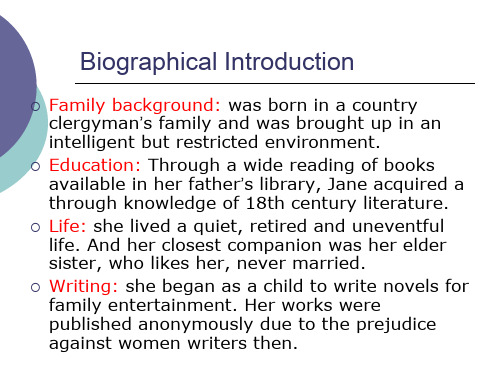
Biographical Introduction
Family background: was born in a country clergyman’s family and was brought up in an intelligent but restricted environment.
rejects an offer of marriage because the young nobleman who makes it has been rude to her family.
Mr and Mrs Bennet live with their five daughters at Longbourn near London. Because they have no son, their property will have to pass, according to the law at that time, to a cousin, William Collins. Hoping to secure their daughters’ position in society, they both want to marry them to some wealthy gentlemen. It so happens that Charles Bingley, a single man in possession of a good fortune, comes to settle in the neighborhood with his two sisters and his friend Fitzwilliam Darcy, who is also rich and unmarried. Bingley and Jane fall in love with each other almost at first sight. And Darcy is attracted to Jane’s sister Elizabeth, but he offends her by his insolent behavior and rude remarks at a ball. The dislike and repulsion is increased by the pride of the one and the prejudice of the other.
傲慢与偏见英文简介3篇

《傲慢与偏见英文简介》傲慢与偏见英文简介(一):傲慢与偏见英文简介Elizabeth Bennet, a smart, kind country girl, is the second of the five daughters in her family。
The family has no son, so it isthe cousin, Mr。
Collins that inherits[1] the fortune。
Mrs。
Bennet isalways finding rich husbands for her five daughters。
The appearance of Mr。
Bingley and Mr。
Darcy makes the familys life different。
The two gentlemen attend a ball。
Then Mr。
Bingley makes a good impression, while Mr。
Darcy appears proud and refuses to dance with Elizabeth。
Soon after, Darcy finds himself fond of Elizabeth, but he tries to hide his feeling。
Later the cousin Mr。
Collins visits the family。
He wants to choose Jane as his wife。
However, she is engaged with Mr。
Bingley。
Then Collins thinks Elizabeth is also a good choice, while he is refused again。
At the same time, Elizabeth meets Mr。
《傲慢与偏见》英文简介

《傲慢与偏见》英文简介Pride and PrejudiceJane Austen began her second novel, Pride and Prejudice, before she was twenty-one. It was originally titled First Impression because the appearances of the characters created the plot of the novel. However, because the novel is also concerned with the effects of the character's first impressions, that is their prejudice, Jane found the title Pride and Prejudice more appropriate.Pride and Prejudice, similar to other Jane Austen's novels, is written in gentle or Horacian satire. The main object of Jane's satire in the novel is the mercenary and the ignorance of the people, a common criticism of the 18th century. Characters in the novel which best carries these qualities are Mrs. Bennet, a foolish woman who talks too much and is obsess with getting her daughters married; Lydia Bennet, the youngest of the Bennet daughter who is devoted to a life of dancing, fashions, gossips and flirting; and Mr. Williams Collins, the silly and conceited baboon who is completely stupify by Lady Catherine in every aspect of his life that he has forgotten his own morals and duty. The tone of the novel is light, satirical, and vivid. Scenes such as Mr. Collins proposal to Elizabeth, and Lady Catherine visits to Lizzy at Longbourn, provides comic relief to the reader while at the same time revealing certain characteristics of the characters. For example, Lydia's lack of common sense and responsibility is revealed when she takes pride in being the first Bennet girl to be married. Lydia does not take into consideration the circumstance of her marriage, the personality of her husband, or the prospects of their marriage for the future. Elizabeth Bennet's ability to laugh off her misfortunate and to continue to be optimistic, considering her situation, also contributes to the tone of the novel. The point of view in Pride and Prejudice is limited omniscient; the story is told through Elizabeth, but not in first person. As a result, the mood of the novel lacks dramatic emotions. The atmosphere is intellectual and cold; there is little descriptions of the setting. The main actions of the novel are the interactions between opinions, ideas, and attitudes, which weaves and advances the plot of the novel. The emotions in the novel are to be perceived beneath the surface of the story and are not to be expressed to the readers directly. Jane's powers of subtle discrimination and shrewd perceptiveness is revealed in Pride and Prejudice; she is able to convey such a complex message using a simple, yet witty, style.The main subject in the novel is stated in the first sentence of the novel: "It is a truth universally acknowledged, that a single man in possession of a good fortune, must be in want of a wife." In this statement, Jane has cleverly done three things: she has declared that the main subject of the novel will be courtship and marriage, she has established the humorous tone of the novel by taking a simple subject to elaborate and to speak intelligently of, and she has prepared the reader for a chase in the novel of either a husband in search of a wife, or a women in pursuit of a husband. The first line also defines Jane's book as a piece of literature that connects itself to the 18th century period. Pride and Prejudice is 18th century because of the emphasis on man in his social environment rather than in his individual conditions. The use of satire and wit, a common form of 18th century literature, also contributes to label the book as 18th century. However, because Jane Austen had allowed personal feelings of the characters to beexpressed in her work, she can also be classified as Romantic. In the figure of Elizabeth, Jane Austen shows passion attempting to find a valid mode of existence in society. Passion and reasons also comes together in the novel to show that they are complementary of marriage.There are seven different marriages presented in the novel. Excluding the Gardiner and the Lucas, the remaining five marriages contrasts each other to reveal Jane's opinions and thoughts on the subject of marriage.The marriage between Darcy and Elizabeth reveals the characteristics which constitutes a successful marriage. One of these characteristics is that the feeling cannot be brought on by appearances, and must gradually develop between the two people as they get to know one another. In the beginning, Elizabeth and Darcy were distant from each other because of their prejudice. The series of events which they both experienced gave them the opportunity to understand one another and the time to reconcile their feelings for each other. Thus, their mutual understanding is the foundation of their relationship and will lead them to a peaceful and lasting marriage. This relationship between Elizabeth and Darcy reveals the importance of getting to know one's partner before marrying. The marriage between Jane Bennet and Bingley is also an example of successful marriage. Jane Austen, through Elizabeth, expresses her opinion of this in the novel:"....really believed all his [Bingley] expectations of felicity, to be rationally founded, because they had for basis the excellent understanding, and super-excellent disposition of Jane, and a general similarity of feeling and taste between her and himself." (Chapter 55) However, unlike Darcy and Elizabeth, there is a flaw in their relationship. The flaw is that both characters are too gullible and too good-hearted to ever act strongly against external forces that may attempt to separate them:"You [Jane and Bingley] are each of you so complying, that nothing will ever be resolved on; so easy, that every servant will cheat you; and so generous, that you will always exceed your income." (Chapter 55)Obviously, Lydia and Wickham's marriage is an example of an bad marriage. Their marriage was based on appearances, good looks, and youthful vivacity. Once these qualities can no longer be seen by each other, the once strong relationship will slowly fade away. As in the novel, Lydia and Wickham's marriage gradually disintegrates; Lydia becomes a regular visitor at her two elder sister's homes when "her husband was gone to enjoy himself in London or Bath." Through their relationship, Jane Austen shows that hasty marriage based on superficial qualities quickly cools and leads to unhappiness. Although little is told of how Mr. Bennet and Mrs. Bennet got together, it can be inferred by their conversions that their relationship was similar to that of Lydia and Wickham - Mr. Bennet had married a woman he found sexually attractive without realizing she was an unintelligent woman. Mrs. Bennet's favoritism towards Lydia and her comments on how she was once as energetic as Lydia reveals this similarity. Mr. Bennet's comment on Wickham being his favorite son-in-law reinforces this parallelism. The effect of the relationships was that Mr. Bennet would isolate himself from his family; he foundrefugee in his library or in mocking his wife. Mr. Bennet's self-realization at the end of the novel in which he discovers that his lack of attention towards his family had lead his family to develop the way they are, was too late to save his family. He is Jane Austen's example of a weak father. In these two latter relationships, Austen shows that it is necessary to use good judgement to select a spouse, otherwise the two people will lose respect for each other.The last example of a marriage is a of a different nature than the ones mentioned above. The marriage between Mr. Collins and Charlotte is based on economics rather than on love or appearance. It was a common practice during Austen's time for women to marry a husband to save herself from spinsterhood or to gain financial security. However, Jane Austen viewed this as a type of prostitution and disapproved of it. In Pride and Prejudice, Jane Austen dramatizes this form of women inequality and show that women who submits themselves to this type of marriage will have to suffer in tormenting silence as Charlotte does:"When Mr. Collins said any thing of which his wife might reasonably be ashamed, which certainly was not unseldom, she [Elizabeth] would involuntarily turned her eye on Charlotte. Once or twice she could discern a faint blush; but in general Charlotte wisely did not hear." (Chapter 28)These five marriages contributes to the theme that a happy and strong marriage takes time to build and must be based on mutual feeling, understanding, and respect. Hasty marriages acting on impulse, and based on superficial qualities will not survive and will lead to inevitable unhappiness.In Pride and Prejudice, Jane has denounced the elements of marriage and society that she found distasteful. These are the conclusions of her observation of the people in her world. However in her writing, Jane has also reflected her own enjoyment in life among these people with and without their faults.。
Pride and Prejudice-简·奥斯汀傲慢与偏见英文简介 作者简介
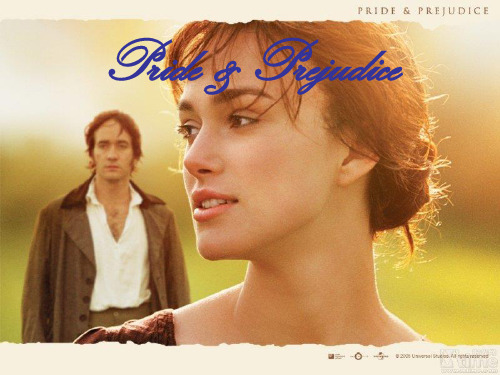
★bright, attractive, thoughtful, humorous, sympathetic, independent little woman, whose sunny qualities are unconsciously reflected in all her books.
Jane Austen
Life
Career
Characteristics of Her
works
Quotations
1775 born at Steventon rectory, Hampshire,England 1817, Jane was sent to Winchester to take the treatment by her sister,but at last she die and buried in Winchester Cathedral, unmarried 1816,Jane caught the tuberculosis
Characteristics of Her Works
---her heroines return society to a more moderate course as a reaction to 18th century sentimentalism ---wit and irony provide stability because they regulate conduct ---Cosmic order in courtship and marriage
• So Elizebeth'accuses him of being responsible for the separation between Mr. Bingley and Jane, her sister and of ill-treating Mr. Wickham , a young officer who was the son of Darcy’s former steward because when Darcy shows his love he cannot help showing contempt for her inferior social position . • After Elizebeth'’s refusal of him, Darcy writes a letter where he explains that Wickham was an unscrupolous adventurer.
Pride and Prejudice-简·奥斯汀傲慢与偏见英文简介 作者简介分解
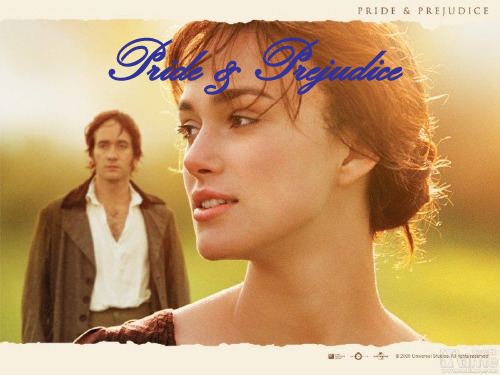
• Darcy.Bingley's friend($)
• extremly arrogant.
• deemed all of Banner's daughters were unquailified to dance with him.
However,felt in love with Jane's sister Elizabeth and gruadually changed his attitude.
Pride & Prejudice
Plot
Author
Background
Character Themes
Plot Overview
Once upon a time,there was a villager called Bennet who had five unmarried daughters.Bannet's wife always tried to find husbands who were suitable for their daughters.
Engraving of Steventon rectory, home of the Austen family during much of Jane Austen's lifetime
The cottage in Chawton where Jane Austen lived during the last eight years of her life, now Jane Austen's House Museum
• After Elizebeth'’s refusal of him, Darcy writes a letter where he explains that Wickham was an unscrupolous adventurer.
【范文】傲慢与偏见英文简介3篇
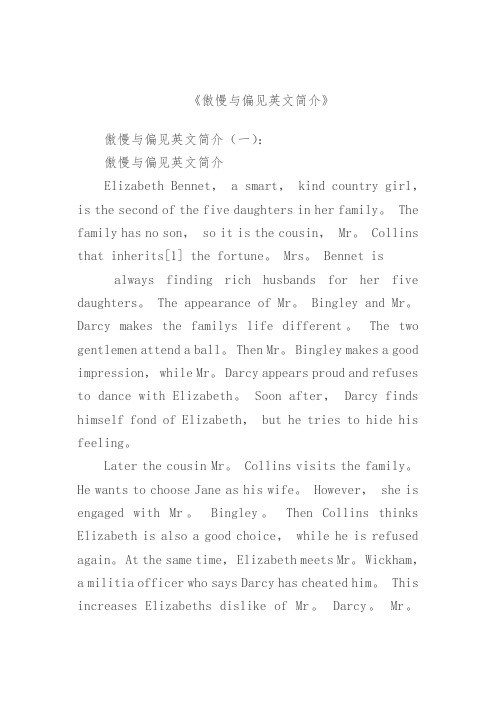
《傲慢与偏见英文简介》傲慢与偏见英文简介(一):傲慢与偏见英文简介Elizabeth Bennet, a smart, kind country girl,is the second of the five daughters in her family。
The family has no son, so it is the cousin, Mr。
Collins that inherits[1] the fortune。
Mrs。
Bennet is always finding rich husbands for her five daughters。
The appearance of Mr。
Bingley and Mr。
Darcy makes the familys life different。
The two gentlemen attend a ball。
Then Mr。
Bingley makes a good impression, while Mr。
Darcy appears proud and refuses to dance with Elizabeth。
Soon after, Darcy finds himself fond of Elizabeth, but he tries to hide his feeling。
Later the cousin Mr。
Collins visits the family。
He wants to choose Jane as his wife。
However, she is engaged with Mr。
Bingley。
Then Collins thinks Elizabeth is also a good choice, while he is refused again。
At the same time, Elizabeth meets Mr。
- 1、下载文档前请自行甄别文档内容的完整性,平台不提供额外的编辑、内容补充、找答案等附加服务。
- 2、"仅部分预览"的文档,不可在线预览部分如存在完整性等问题,可反馈申请退款(可完整预览的文档不适用该条件!)。
- 3、如文档侵犯您的权益,请联系客服反馈,我们会尽快为您处理(人工客服工作时间:9:00-18:30)。
From my point of view, true love is no more than observing who the person is and intuitively love who he is. Elizabeth finds his true love. I bet many girls must be jealous of her for being such a wonderful man’s lifelong companion. Me, too. However, I should not conceal my respect and recognition to Elizabeth for she is definitely a great woman.
wealthy and handsome sincere and generous proud and haughty
M r. Darcy : An extremely wealthy aristocrat ,Darcy is proud , haughty and extremely conscious of class differences at the beginning of the novel . He does , however , have a strong sense of honor and virtue . Elizabeth's rebukes after his first proposal to her help him to recognize his faults of pride and socialaring myself thus I'm aware that I will be going expressly against the wishes of my family , my friends, and, I hardly need add, my own better judgment . The relative situation of our families makes any alliance between us a reprehensible connection. As a rational man I cannot but regard it as such myself, but it cannot be helped. Almost from the earliest moments, I have come to feel for you... ..a passionate admiration and regard . which despite my struggles, has overcome every rational objection . I beg you, most fervently, to relieve my suffering and consent to be my wife. 不用说也违背我的理智 ,我们两家地位悬殊 结亲一定 会被严厉谴责 ,我的理智也无法不这么想 但我没有办 法 ,从我们刚认识开始 我就对你产生了… 一份热切的 爱幕和感情 , 尽管不断挣扎 我的理性还是被打败了 .我 必须热切地恳求你 解除我的痛苦,答应嫁给我 .
Jan · Austin (on December 16, 1775 ~1817 years on July 18) British female writer of fiction. Born in village small town Stiven, the father is local church parish pastor. Austin not on Regular school, but receives the good home education. About her 20 years old starts to write, altogether has published 6 novels. In 1811 published "Reason And Emotion" is her maiden work, afterward one after another has expressed “Pride And Prejudice" (1813), "the Mansfield Garden" (1814) and "Emma" (1815). "Sang Thought that Temple" (also names "Sang To think Monastery") and "Advising" (1818) is after she died second year publication, and bureau on author real name. Austin lifelong unmarried, is
Elizabeth is the second child in a family of five daughters. Though the circumstances of the time and environment require her to seek a marriage of convenience for economic security, Elizabeth wishes to marry for love. Her admirable qualities are numerous—she is lovely, clever, and, in a novel defined by dialogue, she converses as brilliantly as anyone. Her honesty, virtue, and lively wit enable her to rise above the nonsense and bad behavior. Nevertheless, her sharp tongue and tendency to make hasty judgments often lead her astray
